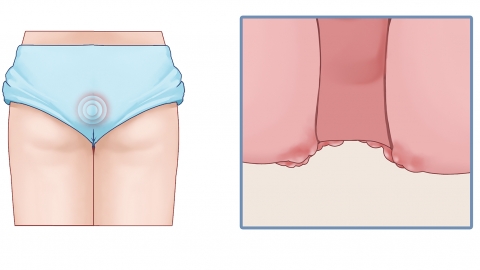What are the symptoms of anal and rectal polyps?
Generally, anal and rectal polyps may present symptoms such as rectal bleeding, prolapse, abdominal discomfort, mucus in stool, and constipation. If discomfort occurs, timely medical consultation is recommended. Detailed explanations are as follows:

1. Rectal Bleeding
The mucosal surface of rectal polyps is fragile. As feces moves through the intestines, it may rub against the polyps, causing damage and bleeding. The blood is usually bright red, appears after defecation, does not mix with the stool, and the amount is generally small, often only visible as blood on toilet paper after wiping. However, long-term rectal bleeding may lead to anemia and affect overall health.
2. Prolapse
As the polyp grows larger and its stalk becomes longer and thinner, during defecation, peristalsis and increased abdominal pressure may push the polyp out of the anus. Initially, the polyp may retract on its own after bowel movements, but as the condition progresses, manual repositioning may be required or the polyp may no longer be reducible. This can lead to complications such as inflammation and incarceration.
3. Abdominal Discomfort
Polyps may irritate the intestinal mucosa and cause disordered intestinal motility. Patients may experience abdominal discomfort, mild pain, and possibly diarrhea with increased frequency of bowel movements. The resulting gastrointestinal dysfunction affects digestion and nutrient absorption, and long-term effects may reduce quality of life and impair nutrition intake.
4. Mucus in Stool
Polyps can stimulate the intestinal mucosa to secrete more mucus, which is excreted with the stool, resulting in mucus-filled stools. Normally, only a small amount of mucus is present in stool, but when rectal polyps are present, the mucus amount significantly increases and may sometimes contain blood streaks. Severe cases may affect the shape and consistency of stool, interfering with normal defecation.
5. Constipation
Larger polyps may partially obstruct the intestine, impeding the passage of feces. As intestinal peristalsis attempts to propel the feces forward, the obstruction causes prolonged retention of stool in the intestines, excessive water absorption, and hardened, dry stool, resulting in constipation. Constipation not only increases patient discomfort but may further irritate the polyps, worsening the condition.
These symptoms may affect patients' lives and health to varying degrees. Prompt medical evaluation and treatment are necessary upon symptom onset. It is recommended to consume more vegetables and fruits, maintain a healthy diet, and prevent the occurrence of diseases.









